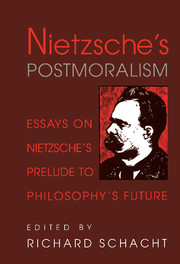Book contents
- Frontmatter
- Contents
- Contributors
- Preface
- A Note on References
- Introduction
- Nietzsche on the Illusions of Everyday Experience
- Masters without Substance
- Rethinking the Subject: Or, How One Becomes-Other Than What One Is
- The Youngest Virtue
- Morality as Psychology, Psychology as Morality: Nietzsche, Eros, and Clumsy Lovers
- On the Rejection of Morality: Bernard Williams's Debt to Nietzsche
- Nietzsche's Virtues: A Personal Inquiry
- Nietzschean Normativity
- Nietzsche's Perfectionism: A Reading of Schopenhauer as Educator
- Bibliography
Morality as Psychology, Psychology as Morality: Nietzsche, Eros, and Clumsy Lovers
Published online by Cambridge University Press: 20 May 2010
- Frontmatter
- Contents
- Contributors
- Preface
- A Note on References
- Introduction
- Nietzsche on the Illusions of Everyday Experience
- Masters without Substance
- Rethinking the Subject: Or, How One Becomes-Other Than What One Is
- The Youngest Virtue
- Morality as Psychology, Psychology as Morality: Nietzsche, Eros, and Clumsy Lovers
- On the Rejection of Morality: Bernard Williams's Debt to Nietzsche
- Nietzsche's Virtues: A Personal Inquiry
- Nietzschean Normativity
- Nietzsche's Perfectionism: A Reading of Schopenhauer as Educator
- Bibliography
Summary
das Thun ist Alles
Zur Genealogie der Moral, I:13Der Glaube ‘so und so ist es’ zu verwandeln in den Willen ‘so und so soil es werden.’
Der Wille zur Macht, §324In §23 of Beyond Good and Evil, Nietzsche encourages us to “clench our teeth,” “open our eyes,” and “keep our hand firm on the helm.” We are to make a voyage that will entitle us to demand that “psychology be recognized again as the queen of the sciences, for whose service and preparation the other sciences exist. For psychology is now again the path to the fundamental problems.”
The claim for the priority of psychology leads in many directions. It leads first to the familiar view of Nietzsche as a deflationary critic, exposing “human all too human” origins, or the low origins of the high. This enterprise, if aetiological, appears to be about real, if somehow hidden, unacknowledged psychological motives; if hermeneutical, about real, if somehow hidden, unacknowledged psychological meaning. Whether writing in the style of earlier French psychologists (as if radicalizing Montaigne, Voltaire, La Rochefoucauld) or anticipating modern reductionist claims about religion or mores, Nietzsche clearly means to explain the motivations behind, and the meaning of, philosophical, religious, and moral phenomena in nonphilosophic, nonreligious, and nonmoral terms. His summary label for such an account is “psychology”; and that suggests something that looks right at home in the “left Hegelian” or “post-Feuerbachean” or “pre-Freudean” side of things in the late nineteenth century, especially when the themes are religious or moral.
- Type
- Chapter
- Information
- Nietzsche's PostmoralismEssays on Nietzsche's Prelude to Philosophy's Future, pp. 79 - 99Publisher: Cambridge University PressPrint publication year: 2000



